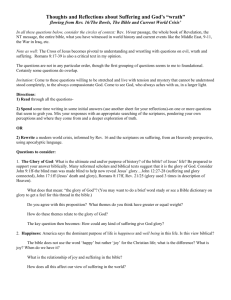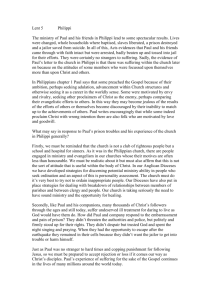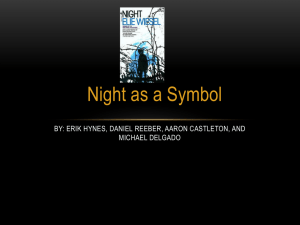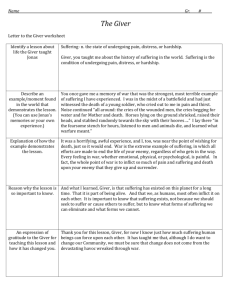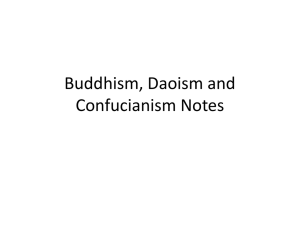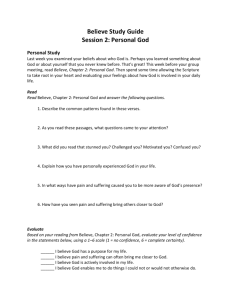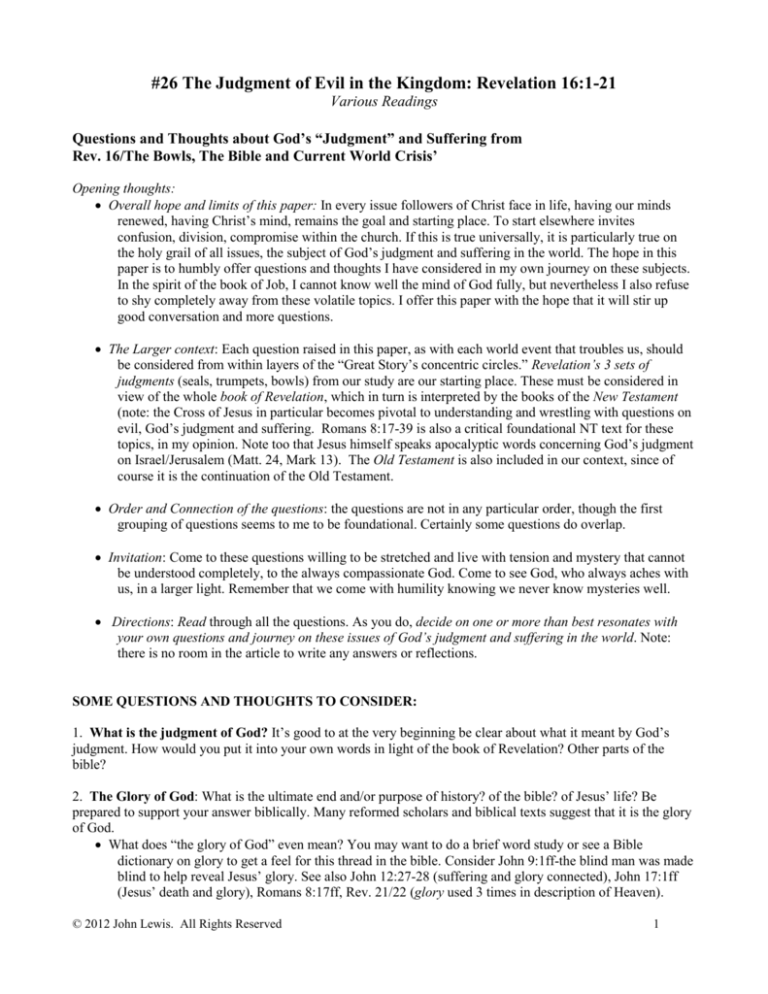
#26 The Judgment of Evil in the Kingdom: Revelation 16:1-21
Various Readings
Questions and Thoughts about God’s “Judgment” and Suffering from
Rev. 16/The Bowls, The Bible and Current World Crisis’
Opening thoughts:
Overall hope and limits of this paper: In every issue followers of Christ face in life, having our minds
renewed, having Christ’s mind, remains the goal and starting place. To start elsewhere invites
confusion, division, compromise within the church. If this is true universally, it is particularly true on
the holy grail of all issues, the subject of God’s judgment and suffering in the world. The hope in this
paper is to humbly offer questions and thoughts I have considered in my own journey on these subjects.
In the spirit of the book of Job, I cannot know well the mind of God fully, but nevertheless I also refuse
to shy completely away from these volatile topics. I offer this paper with the hope that it will stir up
good conversation and more questions.
The Larger context: Each question raised in this paper, as with each world event that troubles us, should
be considered from within layers of the “Great Story’s concentric circles.” Revelation’s 3 sets of
judgments (seals, trumpets, bowls) from our study are our starting place. These must be considered in
view of the whole book of Revelation, which in turn is interpreted by the books of the New Testament
(note: the Cross of Jesus in particular becomes pivotal to understanding and wrestling with questions on
evil, God’s judgment and suffering. Romans 8:17-39 is also a critical foundational NT text for these
topics, in my opinion. Note too that Jesus himself speaks apocalyptic words concerning God’s judgment
on Israel/Jerusalem (Matt. 24, Mark 13). The Old Testament is also included in our context, since of
course it is the continuation of the Old Testament.
Order and Connection of the questions: the questions are not in any particular order, though the first
grouping of questions seems to me to be foundational. Certainly some questions do overlap.
Invitation: Come to these questions willing to be stretched and live with tension and mystery that cannot
be understood completely, to the always compassionate God. Come to see God, who always aches with
us, in a larger light. Remember that we come with humility knowing we never know mysteries well.
Directions: Read through all the questions. As you do, decide on one or more than best resonates with
your own questions and journey on these issues of God’s judgment and suffering in the world. Note:
there is no room in the article to write any answers or reflections.
SOME QUESTIONS AND THOUGHTS TO CONSIDER:
1. What is the judgment of God? It’s good to at the very beginning be clear about what it meant by God’s
judgment. How would you put it into your own words in light of the book of Revelation? Other parts of the
bible?
2. The Glory of God: What is the ultimate end and/or purpose of history? of the bible? of Jesus’ life? Be
prepared to support your answer biblically. Many reformed scholars and biblical texts suggest that it is the glory
of God.
What does “the glory of God” even mean? You may want to do a brief word study or see a Bible
dictionary on glory to get a feel for this thread in the bible. Consider John 9:1ff-the blind man was made
blind to help reveal Jesus’ glory. See also John 12:27-28 (suffering and glory connected), John 17:1ff
(Jesus’ death and glory), Romans 8:17ff, Rev. 21/22 (glory used 3 times in description of Heaven).
© 2012 John Lewis. All Rights Reserved
1
Do you agree with this proposition that the glory of God is a dominant theme in the bible? What themes
in the bible do you think have greater or equal weight?
How do other important biblical themes relate to the glory of God?
The key question now surfaces: Could any kind of suffering give God glory? When? How?
3. Happiness: Is the American culture assumption that happiness is the purpose of life-how biblical is it?
The bible does not use the word ‘happy’ but rather ‘joy’ for the Christian life; what is the difference of
joy and happiness? What is joy? When do we have it? What is the relationship of joy and suffering in
the bible?
4. Can suffering ever be “good”? If so, how and when is suffering in any sense good?
Consider: In what ways was suffering ever good in the Old Testament story? (consider e.g. the Fall,
Cain/Abel, Noah, Babel, wilderness, Judges cycle, the Prophets/OT Israel/The Exile)
Jesus “learned Obedience in suffering.” (Heb. 5:8) What does that suggest about the connection of growth
and suffering for us then who are made in his image? See Phil. 3:10-14 for connections to Paul’s life.
How did Job grow through his ‘undeserved’ sufferings?
Why do tragedies often move 1) Christian and 2) non-Christian people to becoming hot or cold, more
dependent on God or themselves? Is this good from God’s perspective? (Rev. 3:14ff)
5. What do you believe about the relationship of God’s holiness and his wrath? They are inseparable from
each other and his love according to Scripture, and large biblical texts are devoted to these two themes.
Why is the holiness of God, his wrath and judgment so hard for Western Christians to talk about or
accept? Consider American culture, our dominant view of God, of sin, of choice, of ourselves as you
answer this question.
Consider other cultures: is it easier for many of them to believe in the judgment and wrath of God? Why
or why not?
6. Why is there any good in the world if God is holy?
Is this a better or at least equal biblical question than “why is there evil in the world if God is loving?”
From the perspective of a holy God, do we deserve to suffer? Christians? Non-Christians? Even those
who have not heard the gospel directly? See Romans 1:18ff, e.g.
The 1st century Jews, who feared God, lived by a code of honor and shame, would not dare to call God
ABBA or friend, asked, “How can God who is a holy judge and greatly feared be loving and gracious?”
We are often impatient at how long it took the Jews to understand that God is loving even toward his
“enemies.” (Jonah, e.g.)
In our day, where God is often treated as friend more than one to be revered, we ask, “How can a God
who is loving and gracious be judge or an agent of wrath?”
Would a transplanted 1st Century Jew be impatient at our inability to revere God or to embrace His holy
wrath, to see “The Great I AM” as too small and remade in our own image?
Is it possible that the cross brings both poles of God’s character (love and wrath), both extreme questions
into a possible “communion?” How would you state this in your own words?
7. Is God’s judgment and wrath something that comes from God only at the end of time or also in world
history as we know it? Is any suffering at all in this life judgment from God?
How are we so sure when He is or is not judging? (9-11, e.g.)
How do you know or differentiate when it is or isn’t, or can you?
If God used and “initiated” the suffering in Exodus, of Babylon, and in Revelation (Lamb opens the
scrolls/Roman judgment) to judge and call the nations/His people to repent (“discipline”), are those the
only times he initiates uses suffering that way? Does he not do so in lesser extreme crisis’s in-between?
© 2012 John Lewis. All Rights Reserved
2
If other aspects of God’s kingdom are present now and fulfilled at Christ’s return, could not judgment be
also in that category?
8. The sovereignty of God: What does it mean for God to be 100% sovereign as king over all life’s happenings,
yet also willing to limit Himself in some ways to accommodate to His creation? Do you believe in this biblical
tension?
In Exodus, the writer after each plague goes back and forth from saying that Pharaoh hardened his heart
and that God hardened his heart. What does this suggest about the tension described above?
Job 1 gives us the picture that Satan is a servant of God, that he can do nothing to Job without God’s
request. What does this suggest re: our interpretation of Evil happening on earth?
What might God’s sovereignty have to do with suffering and judgment?
What does it mean for God to allow something to happen? If it is not somehow his will, is God truly king
now as these events take place, or is God ultimately king only after the final judgment?
9. Individual vs. Community Emphasis: Does God share our utter commitment to the rights of the individual
over and above the welfare of the larger community?
Do you think God agrees with Caiphas that sometimes it is best for a few to suffer and die on behalf of a
larger group that might otherwise not wake up and perish?
Consider Annias and Saphira (Acts 4), the slaughters of Canaanites in the conquest of promised land,
Achan in Josh. 7, the Egyptian army drowning in Red Sea, Sodom and Gomorrah, as well as 1/3 being
judged in order to give the other 2/3 a chance to repent. What do you think these stories tell us about
God’s character?
10. What does the fear of the Lord (i.e. the beginning of wisdom in the OT) tell us about God’s judgment?
Is there a healthy fear involved in the Kingdom of God? Why or why not?
Judgment sometimes produces a healthy fear of God in people, sometimes unhealthy fear. See Is. 26:810.
Is part of fearing God being aware of his judgment on sin in this life? Why or why not?
11. Our perception and proclamation of God’s judgment to others: Job’s peers merely made suffering a 1/1
correlation with Job’s sin, need for discipline and repentance to rid his pains. These peers, God says, are not
friends or truth bearers at all. Their role is to give kindness (Job 6:14). What does this suggest about our
proclamation to others about God’s judgment in their suffering?
12. God’s discipline vs. suffering: God loves/disciplines us as a parent with a child- (Prov. 3, Heb 12:3ff!!).
Love always includes discipline. Can we see some of the world’s suffering this light, at least partly? When?
13. God’s Wrath in light of the cross: Since Christ died on the cross and took the wrath for sin already, is there
any reason for God to keep bringing wrath on sin through suffering? Is that only for the very end of time?
Why then at the end is God’s wrath needed if Christ already took all that wrath on himself?
What differences might there be between believers and non believers experience of God’s wrath?
14. Believers vs. Unbelievers: Do Christians suffer in different ways than unbelievers? The same ways? Even if
we are under X’s blood? How could that (or even persecution/martyrdom) be right or part of God’s plan?
15. Jesus’ suffering and the cross we carry: If God caused his only beloved to suffer (Is. 53:9-10)….if Jesus
who was God suffered with glorious purpose, doesn’t that suggest that God could cause us to suffer, cause us to
be like his son MORE in that suffering? What else could it mean for us to bear the cross and “fill up what is
lacking in Christ’s suffering”? (Phil. 3:10-11, Col. 1:24)
© 2012 John Lewis. All Rights Reserved
3
16. Community growth and suffering: suffering, even when it’s evil and not my “fault”, can build character in
me personally. Could evil and suffering endured by a nation or a community also do the same?
17. How does our HOPE for the future impact our view of suffering, evil, etc?
This life and its sufferings are not worthy to be compared to the glory that is to be revealed to us (Rom
8:18).
Are our futures more saturated by God’s vision of the future or the hope of a better, successful,
materially prosperous life? If it’s the latter, how will we tend to interpret suffering? How does this view
handicap our ability to see good in suffering?
How does a potential martyr in a persecuted country live in hope? How do they then interpret the evil of
their persecutors? What handicaps might we have that they do not in living in hope and suffering?
18. Common vs. Special: We often differentiate between common grace (I.e., gifts from God all people get to
enjoy whether forgiven or not: order of the world, air to breathe, sunsets, marriage/kids, etc.) and special grace
(Jesus’ forgiveness from our sins, spiritual gifts, intimacy with God, etc. for only those who God calls/those who
receive it. The same is true with common revelation (truth communicated about God through nature,
conscience, etc that is available to all!) and special revelation (truth communicated about God through Jesus,
OT Israel, the church, sacraments, etc., available only to those who are enabled to see). Is it possible to consider
that there might be a kind of suffering “common” to all of us as humans, and suffering that is “special,” i.e., set
apart/differentiated either for God’s people or those people God wants to judge/give another chance to
repent/believe in Him?
If so, how might this add to our conversation about God’s judgment and suffering?
© 2012 John Lewis. All Rights Reserved
4

